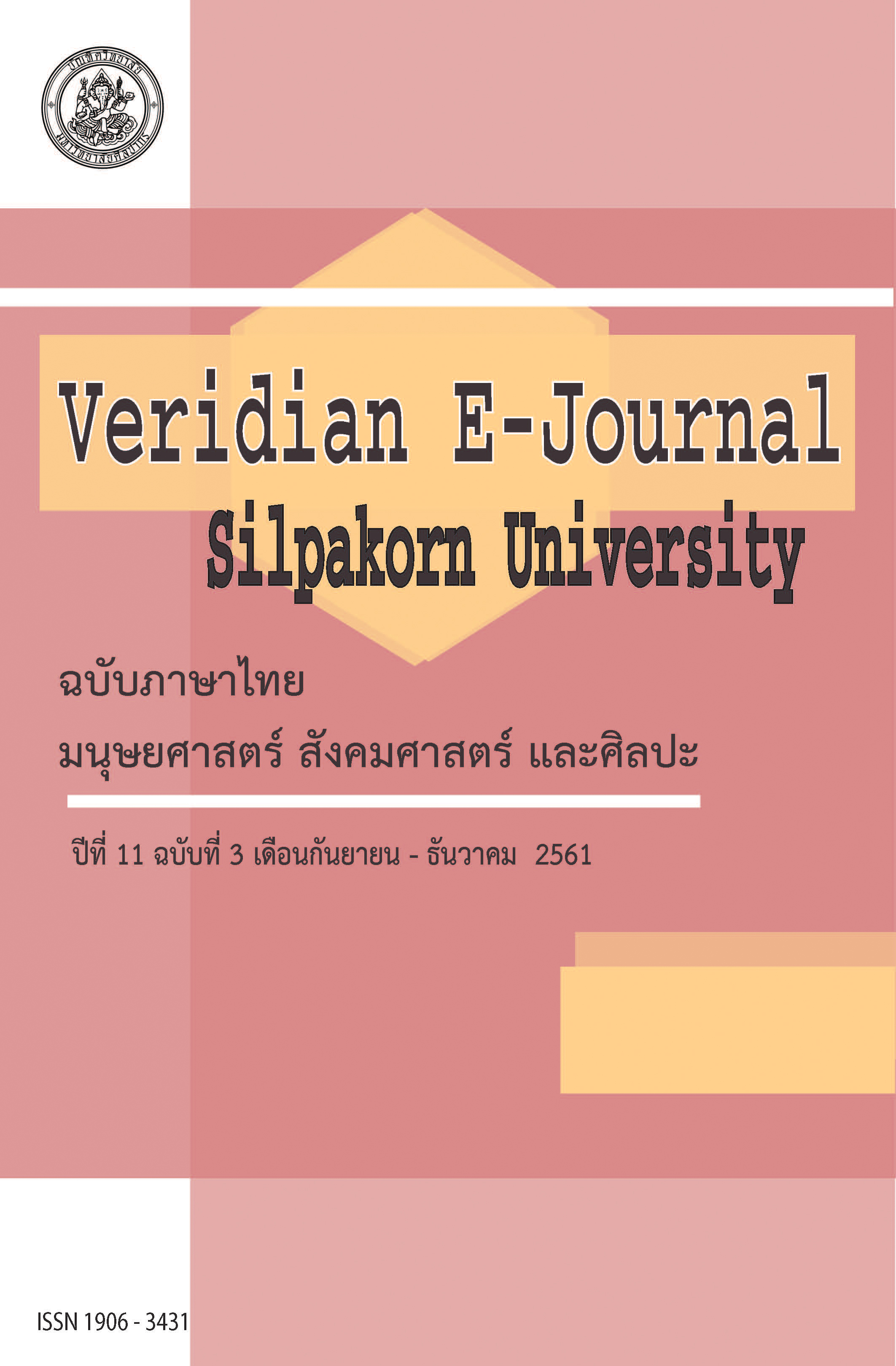การยอมรับและการตัดสินใจเลือกซื้อนิตยสารดิจิทัล การบริหารงานและแนวโน้ม การพัฒนาธุรกิจนิตยสารสู่ธุรกิจนิตยสารดิจิทัลในประเทศไทย (The Acceptance of Digital Magazines and Consumer Decision Making: The Management and Development Trend from Printed Magazines to Digital Magazines in Thailand)
Main Article Content
Abstract
การวิจัยนี้มีวัตถุประสงค์เพื่อศึกษา 1) ความรู้ การยอมรับและการตัดสินใจเลือกซื้อนิตยสารดิจิทัล 2) ความสัมพันธ์ระหว่างความรู้ การยอมรับและการตัดสินใจเลือกซื้อนิตยสารดิจิทัล 3) การบริหารงานนิตยสารดิจิทัล 4) แนวโน้มและเป้าหมายการพัฒนาธุรกิจนิตยสารเล่มสู่ธุรกิจนิตยสารดิจิทัลในประเทศไทย โดยใช้แบบสอบถามเพื่อสำรวจความรู้ การยอมรับและการตัดสินใจซื้อนิตยสารดิจิทัล และใช้การสัมภาษณ์เชิงลึกเพื่อศึกษาการบริหารงานของนิตยสารดิจิทัล แนวโน้มและเป้าหมายการพัฒนาธุรกิจนิตยสารสู่ธุรกิจนิตยสารดิจิทัลในประเทศไทย ผลการวิจัยพบว่า
- ผลการวิเคราะห์ระดับความรู้ การยอมรับและการตัดสินใจเลือกซื้อนิตยสารดิจิทัล พบว่า ความรู้ของกลุ่มผู้อ่านนิตยสารทั้งกลุ่มที่เคยอ่านนิตยสารดิจิทัลและกลุ่มที่ไม่เคยอ่านนิตยสารดิจิทัลมีความรู้ต่อลักษณะของนิตยสารดิจิทัลในระดับต่ำมีสัดส่วนมากที่สุด คิดเป็นร้อยละ 52.75 รองลงมาคือ มีความรู้ระดับกลาง คิดเป็นร้อยละ 45.00 และมีความระดับสูงมีสัดส่วนน้อยที่สุด คิดเป็นร้อยละ 2.25 ตามลำดับ กลุ่มตัวอย่างเปิดรับนิตยสารดิจิทัลด้วยการอ่านโดยไม่เสียค่าใช้จ่ายจากที่ต่างๆมากที่สุด กลุ่มตัวอย่างมีแนวโน้มเลือกอ่านนิตยสารเล่มมากที่สุด แต่เลือกอ่านนิตยสารดิจิทัลน้อยที่สุดเหตุผลที่ไม่อ่านนิตยสารดิจิทัลมากที่สุดคือ ไม่ต้องการจ่าย ส่วนเหตุผลที่เลือกอ่านนิตยสารดิจิทัลมากที่สุดคือ ความสามารถในการแสดงรูปแบบสื่อประสม เช่น ภาพเคลื่อนไหว และเสียงในเนื้อหา กลุ่มตัวอย่างมีความคิดเห็นว่าปัจจัยส่วนประสมทางการตลาดของนิตยสารดิจิทัลมีผลต่อการตัดสินใจเลือกซื้อนิตยสารดิจิทัลในระดับมาก
- ผลการวิเคราะห์ความสัมพันธ์ระหว่างความรู้ การยอมรับและการตัดสินใจเลือกซื้อนิตยสารดิจิทัล พบว่า ความรู้เกี่ยวกับนิตยสารดิจิทัลมีความสัมพันธ์ทางบวกกับการยอมรับและการตัดสินใจเลือกซื้อนิตยสารดิจิทัล ในระดับต่ำ ส่วนการยอมรับนิตยสารดิจิทัลมีความสัมพันธ์ทางบวกกับการตัดสินใจเลือกซื้อนิตยสารดิจิทัล ในระดับปานกลาง
- ผลการสัมภาษณ์เชิงลึกกลุ่มบรรณาธิการบริหารพบว่า การบริหารงานนิตยสารดิจิทัลขึ้นกับ ปัจจัยภายใน คือ นโยบายขององค์กรสื่อที่ต้องการเพียงทดลองตลาดใหม่เพื่อขยายฐานผู้อ่าน แต่ไม่เพิ่มกำลังคนในการผลิตนิตยสารดิจิทัล ใช้ทีมงานนิตยสารเล่มซึ่งขาดทักษะเทคโนโลยีดิจิทัลมาผลิตนิตยสารดิจิทัล ส่วนปัจจัยภายนอกคือนิตยสารดิจิทัลจำกัดอยู่เพียงการอ่านจากไอแพด อินเทอร์เน็ตช้า ผู้อ่านเคยชินกับการดาวน์โหลดโดยไม่เสียค่าใช้จ่าย และผู้อ่านเข้าใจว่านิตยสารดิจิทัลคือ นิตยสารอิเล็กทรอนิกส์ธุรกิจนิตยสารดิจิทัลจึงไม่มีแบบจำลองทางธุรกิจ (Business Model) ที่สร้างรายได้ เนื่องจากผู้อ่านนิตยสารดิจิทัลน้อย ทำให้ผู้ลงโฆษณาไม่ลงโฆษณา องค์กรนิตยสารดิจิทัลควรปรับตัวโดยขยายช่องทางการนำเสนอเนื้อหาให้ครบทุกสื่อทั้งทั้งเว็บไซต์ โซเชียลมีเดีย สื่อสิ่งพิมพ์ โทรศัพท์เคลื่อนที่ และแอปพลิเคชัน รวมทั้งเป็นบริษัทผลิตสื่อดิจิทัล (Digital Agency) ให้กับบริษัทรายใหญ่ในธุรกิจต่างๆ
- ผลการสัมภาษณ์เชิงลึกกลุ่มผู้ประกอบการนิตยสารรายใหญ่ทุกรายไม่มีแผนพัฒนาธุรกิจนิตยสารไปสู่นิตยสารดิจิทัล เนื่องจาก เป็นธุรกิจที่ไม่สร้างรายได้เพราะ ผู้อ่านนิตยสารดิจิทัลน้อย ทำให้ผู้ลงโฆษณาสินค้าในนิตยสารดิจิทัลน้อย ประกอบกับต้นทุนในการผลิตนิตยสารดิจิทัลสูง ตลาดเมืองไทยยังไม่พร้อมสำหรับนิตยสารดิจิทัล แม้นิตยสารดิจิทัลมีจุดเด่นด้านอินเทอร์แอคทีฟตอบสนองความสนใจของผู้อ่านและผู้ลงโฆษณา
“The Acceptance of Digital Magazines and Consumer Decision Making: The Management and Development Trend from Printed Magazines to Digital Magazines in Thailand” has four objectives: 1) to study knowledge, acceptance, and consumer decision making on the purchase of digital magazines 2) to study the relationship between knowledge, acceptance, and consumer decision making on the purchase of digital magazines 3) to study the management of digital magazines and 4) to study the trend and objectives of the development of printed magazines into digital magazines in Thailand. The methodology employed in this study includes a survey of consumers’ knowledge, acceptance and decision-making process on the purchase of digital magazines and in- depth interviews to examine the management of digital magazines, trend, and objectives of the development of printed magazines into digital magazines in Thailand. Summary of findings is as follows:
- The analysis of level of knowledge, acceptance and decision making on the purchase of digital magazines has found that knowledge of magazine readers, both those who have been exposed and those who have never been exposed to digital magazines, is at the lowest point, which is 52.45 percent, at mid-point, which is 45 percent and at the highest point, which is 2.25 percent, respectively. Most readers chose to read free digital magazines. The studied sample was most likely to choose to read printed magazines, and least likely to read digital magazines. The main reason given for not reading digital magazines was the subscription fee while the main reason given for reading digital magazines was the multimedia features available in digital magazine such as animation and sound. Respondents reason that the marketing mix of digital magazine influenced purchasing decision at a high level.
- The analysis of relationship between knowledge, acceptance, and consumer decision making on the purchase of digital magazines demonstrates that the positive relation of the knowledge about digital magazines and decision making is low. The positive relation of digital magazines acceptance and decision making is at medium.
- It can be concluded from in-depth interviews with magazine executive editors that the management of digital magazines is dependent on internal factors which are the organization’s policy to experiment the new market in order to expand readership without investment on personnel to develop the magazine’s digital version, and the employment of staff who lack digital and technological skills. External factors are the fact that digital magazines are limited to to iPad users, and the slow speed of the internet. Readers are used to free download and readers misunderstand that digital magazines are electronic magazines; as a result, the digital magazine business lacks a successful model. Due to a small portion of readers, advertising agencies do not invest in digital magazines. In order to survive, digital magazines should adapt themselves by expanding their distribution channels, including website, social media, printing media, mobiles and other applications. Digital magazines should also operate as a digital agency for big corporations.
- Results from in-depth interviews with magazine entrepreneurs shows that every magazine entrepreneur does not have a plan to develop his or her business into a digital magazine since it is not a profitable business. Digital magazines have a small readership, resulting in less interest from advertising agencies, the high digital production cost added to the lack of development plan as well. Even though digital magazines have their distinctiveness about their interactivity, the Thai market is not prepared for digital magazines.
